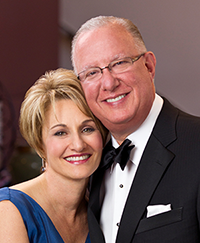| In the epidemic of kidney disease, the number of those people in need far outweighs those donating. Washington, D.C., more than any other city in the United States, has been at the center of this off-balance issue. The Ronald and Joy Paul Foundation, with a $2.5 million gift, is establishing the GW/Ron and Joy Paul Kidney Center to address the urgent need for community awareness of kidney disease diagnosis, prevention, and treatment. |

|
“Joy and I felt very strongly that if we could better educate the community, then we could hopefully reduce the amount of kidney failure,” says Ron Paul, President of Ronald D. Paul Companies, Inc. “Should somebody be in end-stage renal failure, we want to be able to educate them on transplantation. It’s all about awareness and education. That’s what we’re going to be promoting through this center.”
For Paul, the gift strikes a personal note. In the 1980s, he was diagnosed with glomerulosclerosis, a kidney disease that can eventually end in kidney failure. “It came out of nowhere,” he says. “I didn’t have any pre-existing conditions, no diabetes, no high blood pressure, no issues at all other than I found out I had kidney failure.” Eight years later, Paul faced a decision of a lifetime of dialysis or a kidney transplant. He choose a transplant, and his brother, Steven, provided the needed organ. The donated kidney lasted far beyond its typical lifespan, but in 2008, Paul learned he would need another transplant. Again, he received a donation, this time from his longtime friend and CFO of his company, Kathy McCallum.
“When I had my first transplant in 1990, I had two very young children, I was starting a business, we had very little means to be able to support ourselves,” Paul says. “So, going from being pretty sick to being energetic and able to run a real estate company and be chairman of a bank, it’s a great feeling. But most importantly, now it’s a time to help others.”
Organs from live donors, such as brother Steven Paul and partner McCallum, are ideal; they shorten or completely eliminate a patient’s need to be placed on a waiting list or on dialysis, and the short-and long-term survival rates tend to be better than those from deceased donors. With outreach from the GW/Ron and Joy Paul Kidney Center, the Pauls are hoping to tip the balance of kidney supply and demand, a move that could potentially save the lives of Washington area residents.
That mission of giving back to the community is one to which Paul ascribes on a daily basis. Hanging in his office and at his home is a saying from Winston Churchill: We make a living by what we get, but we make a life by what we give.
“That’s what we’ve tried to teach to our children and family, and tried to live by,” he says. “It’s pretty powerful if you can get your arms around it.”